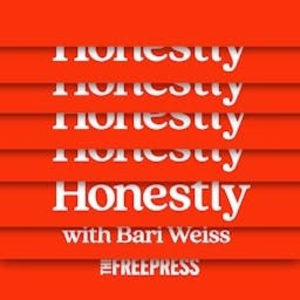
Honestly with Bari Weiss
News & Politics Podcasts
The most interesting conversations in American life happen in private. This show brings them out of the closet. Stories no one else is telling and conversations with the most fascinating people in the country, every week from The Free Press, hosted by former New York Times and Wall Street Journal journalist Bari Weiss.
Location:
United States
Genres:
News & Politics Podcasts
Description:
The most interesting conversations in American life happen in private. This show brings them out of the closet. Stories no one else is telling and conversations with the most fascinating people in the country, every week from The Free Press, hosted by former New York Times and Wall Street Journal journalist Bari Weiss.
Twitter:
@thehonestlypod
Language:
English
Website:
https://www.honestlypod.com/
Email:
tips@honestlypod.com
How We Lost Ourselves to Technology—and How We Can Come Back
Duration:00:56:52
Can Books Save Men?
Duration:01:04:54
Palmer Luckey and the Future of American Power
Duration:01:29:47
Trailer | Spiral: Murder in Detroit
Duration:00:01:59
How Katie Herzog Drank Her Way to Sobriety
Duration:01:05:59
The Hostage Release and the Future of Gaza
Duration:01:59:50
María Corina Machado’s Fight to Free Venezuela
Duration:00:51:44
Niall Ferguson on October 7 and Our Changed World
Duration:01:09:08
He Spent 491 Days as a Hamas Hostage. This Is How He Survived.
Duration:01:35:29
The Future of The Free Press
Duration:00:09:02
How One Man Overcame His Autism
Duration:01:33:15
Inside the Mossad
Duration:01:29:07
Woody Allen on Life and Death
Duration:01:35:30
Charlie Kirk’s Murder and the Rise of Political Violence
Duration:01:28:11
Amy Coney Barrett’s Message for America
Duration:01:18:16
Conversations with Coleman: Three Hostages Families Disagree on How to Get Their Loved Ones Home
Duration:01:07:32
Breaking History: The Invention That Changed Everything
Duration:00:31:44
The Radical Right Is Coming for Our Sons
Duration:00:45:30
Why Amanda Knox Forgave the Man Who Sent Her to Prison
Duration:01:40:08
Why Unions Went for Trump
Duration:01:26:02